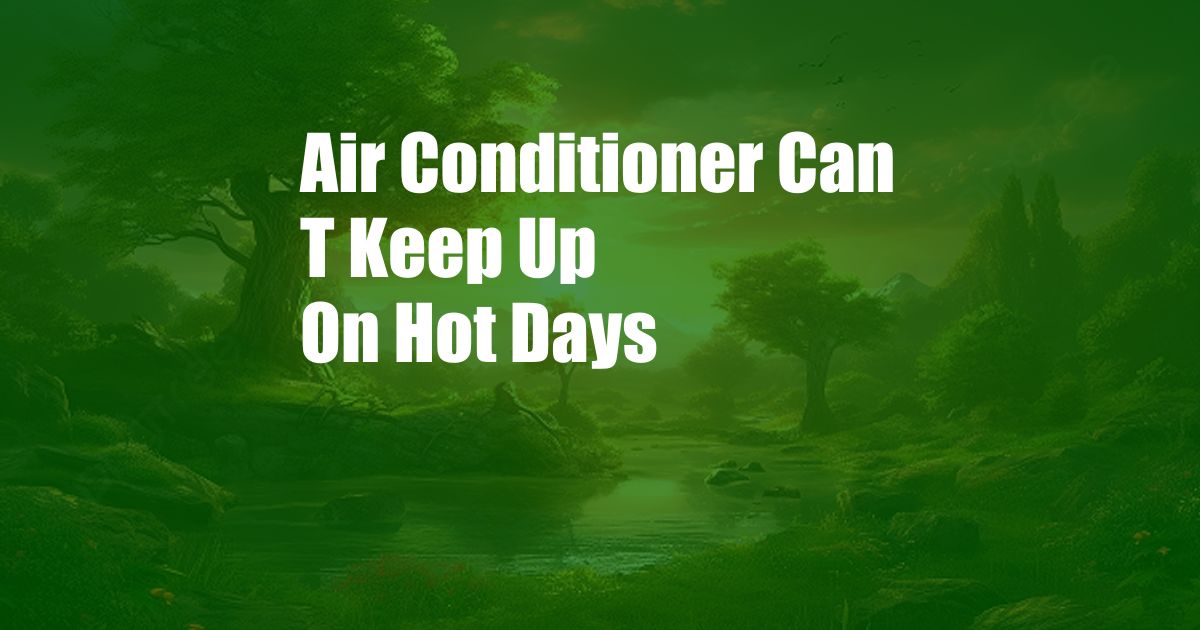
Air Conditioner Can’t Keep Up on Hot Days: Exploring the Causes and Solutions
In the sweltering summer months, many rely on air conditioning to provide relief from the heat. However, there are times when even the most efficient AC unit can struggle to keep up with the soaring temperatures, leaving homeowners feeling frustrated and uncomfortable. If you’ve encountered this issue, don’t despair. In this comprehensive article, we’ll delve into the reasons why your air conditioner may not be able to keep up on hot days and equip you with tips and expert advice to resolve the problem.
Before exploring the causes, let’s first understand the underlying mechanism of an air conditioner. An AC unit works by removing heat from the indoor air and transferring it outside. It consists of a compressor, condenser, evaporator, and expansion valve. The compressor increases the pressure of the refrigerant gas, causing it to flow through the condenser, where heat is released to the outside. The refrigerant then passes through the expansion valve, reducing its pressure and temperature, and flows into the evaporator, where it absorbs heat from the indoor air. The cooled air is then circulated throughout the home.
Understanding the Causes and Solutions
When an air conditioner fails to maintain a comfortable temperature on hot days, it’s essential to identify the underlying cause. Here are some common reasons along with potential solutions:
1. Undersized Air Conditioner
An AC unit that’s too small for the size of your home will struggle to cool effectively, especially during peak heat. To determine if your AC is appropriately sized, consider the square footage of your home, the number of occupants, and the amount of sunlight it receives. If your AC is undersized, you may need to upgrade to a larger unit.
2. Dirty Condenser Coils
The condenser coils, located outside the unit, can become clogged with dirt and debris, obstructing the heat transfer process. Cleaning the coils regularly with a soft brush or hose will ensure optimal performance.
3. Refrigerant Leaks
A refrigerant leak can significantly impair the AC’s cooling capacity. Refrigerant is the fluid that circulates within the AC system, absorbing and releasing heat. If a leak occurs, the system will not be able to absorb heat from the air effectively. Refrigerant leaks require professional repair by a qualified technician.
4. Clogged Air Filter
A dirty air filter can restrict airflow, reducing the AC’s ability to circulate cool air. Changing the air filter regularly (every 1-3 months) is crucial for maintaining optimal airflow.
5. Faulty Thermostat
A thermostat that’s malfunctioning or improperly calibrated may not send the correct signals to the AC, causing it to operate inefficiently. Ensure that the thermostat is correctly installed and calibrated for the desired temperature.
6. Ductwork Issues
Leaking or poorly insulated ductwork can result in significant energy loss, compromising the AC’s cooling performance. Inspect the ductwork for any leaks or gaps and seal them accordingly.
Tips and Expert Advice
In addition to addressing the underlying causes, here are some practical tips and expert advice to enhance the efficiency of your air conditioner on hot days:
1. Adjust Thermostat Settings
For every degree you raise the thermostat, you can save up to 3% on your energy bills. Setting the thermostat to 78 degrees Fahrenheit is generally recommended as an ideal balance between comfort and energy efficiency.
2. Use Fans and Window Coverings
Ceiling fans and portable fans can help circulate the cooled air more effectively. Closing curtains or blinds during the warmest hours of the day can block out sunlight and reduce heat gain.
3. Schedule Regular Maintenance
Regular maintenance by a qualified technician can ensure that your AC is operating efficiently and detect any potential issues before they become major problems.
FAQs on Air Conditioner Inefficiency
Q: Why does my air conditioner turn off and on too often?
A: This could indicate an oversized AC unit, refrigerant leak, or low refrigerant levels.
Q: Can I use a portable air conditioner to supplement my central AC?
A: Yes, portable AC units can provide temporary cooling in specific areas, but they are not as efficient as central AC systems.
Q: How often should I change the air filter in my AC unit?
A: The recommended frequency varies depending on the type of air filter. Check the manufacturer’s recommendations for your specific unit.
Q: What are the signs of a refrigerant leak?
A: Reduced cooling performance, hissing or bubbling sounds, and refrigerant lines covered in frost or ice.
Q: How much does it cost to repair an air conditioner?
A: The cost of AC repair depends on the issue and the extent of repairs required. Consult with a qualified technician for an accurate estimate.
Conclusion
If your air conditioner is struggling to keep up on hot days, addressing the underlying cause is crucial. By understanding the potential reasons and following the tips and expert advice provided, you can restore the efficiency of your AC and enjoy a cool and comfortable home even during the hottest summer months. If you encounter any persistent issues or suspect a major problem, don’t hesitate to consult with a professional HVAC technician for expert assistance.
Are you interested in learning more about air conditioning and home cooling solutions? Feel free to explore our website or contact us directly for personalized advice.